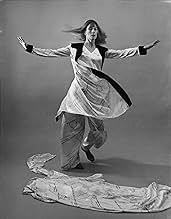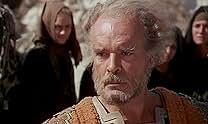NOTE IMDb
6,9/10
1,8 k
MA NOTE
Ajouter une intrigue dans votre langueThe women of Troy face enslavement after the fall of their city.The women of Troy face enslavement after the fall of their city.The women of Troy face enslavement after the fall of their city.
- Réalisation
- Scénario
- Casting principal
- Récompenses
- 2 victoires au total
Pat Beckett
- Woman
- (as Pat Becket)
Elsie Pittas
- Woman
- (as Ersie Pittas)
María García Alonso
- Woman
- (as Maria G. Alonso)
Nilda Álvarez
- Woman
- (as Nilda Alvarez)
Avis à la une
Euripides has always been regarded as the most 'modern' of Greek dramatists and although, for a man of his time, he took little part in either politics or war, it is surely no coincidence that his Trojan War trilogy was written during the protracted war between the Delian and Peloponnesian Leagues which would eventually subjugate Athens and bring its Golden Age to an inglorious end.
As a pacifist, director Michael Cacoyannis felt a deep affinity with 'The Trojan Women', the first play in the trilogy and had staged it in the 1960's. Having previously filmed a magnificent version of Euripides' 'Electra' in stark black and white with Greek actors, he has here a larger budget, glorious colour and a starry international cast but it is not nearly as effective.
Hecuba is one of those 'woe is me' characters. Granted, she has a great deal to be woeful about but the playing of her presents a daunting challenge to any actress brave enough to take it on. Katherine Hepburn varies the moans and groans well enough and her gritty professionalism sees her through. Her lament over the corpse of her grandson Astyanax is great film acting. The character of Andromache represents fidelity and virtue and this is captured very well by Vanessa Redgrave but she is played as a symbol rather than a flesh and blood character and this dimishes ones sympathy for her. Genevieve Bujold plays 'mad' Cassandra and has an excellent duologue with Hecuba before being carted off. Ironically if Cassandra's prophecies had been heeded and not dismissed as mere ravings the Greeks would not have been able to pull the Trojan Horse trick! The one who comes out best is the Helen of Irene Papas. This stunning artiste had already excelled as Electra for this director and as Antigone for Jorgos Tzavellas and her casting here is inspired as she is the complete antithesis of what we expect the character to be. She is strong, manipulative and sexually confident. If any face could 'launch a thousand ships' this is it! Her betrayed husband Menelaus, intends killing her but she knows and we know that of course he won't!
Cacoyannis has made a noble attempt to bring this powerful and poignant material to a wider audience but the film alas is weakened by poor editing, an intrusive score by Mikis Theodorakis and a female chorus that simply gets in the way. Ah, woe!
As a pacifist, director Michael Cacoyannis felt a deep affinity with 'The Trojan Women', the first play in the trilogy and had staged it in the 1960's. Having previously filmed a magnificent version of Euripides' 'Electra' in stark black and white with Greek actors, he has here a larger budget, glorious colour and a starry international cast but it is not nearly as effective.
Hecuba is one of those 'woe is me' characters. Granted, she has a great deal to be woeful about but the playing of her presents a daunting challenge to any actress brave enough to take it on. Katherine Hepburn varies the moans and groans well enough and her gritty professionalism sees her through. Her lament over the corpse of her grandson Astyanax is great film acting. The character of Andromache represents fidelity and virtue and this is captured very well by Vanessa Redgrave but she is played as a symbol rather than a flesh and blood character and this dimishes ones sympathy for her. Genevieve Bujold plays 'mad' Cassandra and has an excellent duologue with Hecuba before being carted off. Ironically if Cassandra's prophecies had been heeded and not dismissed as mere ravings the Greeks would not have been able to pull the Trojan Horse trick! The one who comes out best is the Helen of Irene Papas. This stunning artiste had already excelled as Electra for this director and as Antigone for Jorgos Tzavellas and her casting here is inspired as she is the complete antithesis of what we expect the character to be. She is strong, manipulative and sexually confident. If any face could 'launch a thousand ships' this is it! Her betrayed husband Menelaus, intends killing her but she knows and we know that of course he won't!
Cacoyannis has made a noble attempt to bring this powerful and poignant material to a wider audience but the film alas is weakened by poor editing, an intrusive score by Mikis Theodorakis and a female chorus that simply gets in the way. Ah, woe!
This is a remarkably ineffectual filming of Euripides' magnificent examination of the effects of war on women. Euripides embarrassed Athens with his realism and blatant theatricality, neither of which is on view here. The four-star cast intone their limes reverently, as if reading holy scripture, never becoming real women watching their city burn and awaiting slavery and rape. The staging is stiff and posey,farther distancing a viewer from emotional involvement. The translation is stiff and respectful. One might say that this great play is here respected to death. In short, the film shows astonishingly little invention or imagination. And how is it that all the women of Troy managed to dress in identical matching rags? This is the only film of this immortal play. Someone with feeling and passion, film it again, please.
A greek tragedy is very hard to be made into a movie. In my opinion it is really almost impossible as there are often long monologues that can't be cut or improved in any way. Nevertheless Michael Cacoyannis tried, and succeded in filming the best anti-war work ever written. The film is a bit stagy but that is how it should be. Being the editor of his film too, he manages to create a unique atmosphere that in the beginning seems a bit akward but as the plot develops you understand that it is the ideal. The scenery is excellent. We see only the total destruction of the city and that's all we need to see as the narrations must "draw" the total picture of the inner part of the city in our minds. All the performances are first-rate. Katharine Hepburn is heart-breaking as Hecuba. She cries for her lost sons, husband and city. She loves the city and hates the Greeks who give her, the queen of Troy, as slave.
G.Bujold is also excellent as Cassandra. She seems crazy, but she is fully aware of the fate. She delivers a balanced performance avoiding exagerations. Irene Pappas is stunning. Looking more beautiful than ever, she manages to stand opposite Katharine Hepburn's Hecuba and deliver an excellent and utterly convincing performance. But the great performance of the picture is surely Vanessa Redgrave's. Her Adromache seems strange at the beginning but when her character is fully developed, you understand the genius of her performance. This picture is a must-see not only for the excellent performances delivered but four of the greatest actresses of their generation but also for the importance of Euripides play.
G.Bujold is also excellent as Cassandra. She seems crazy, but she is fully aware of the fate. She delivers a balanced performance avoiding exagerations. Irene Pappas is stunning. Looking more beautiful than ever, she manages to stand opposite Katharine Hepburn's Hecuba and deliver an excellent and utterly convincing performance. But the great performance of the picture is surely Vanessa Redgrave's. Her Adromache seems strange at the beginning but when her character is fully developed, you understand the genius of her performance. This picture is a must-see not only for the excellent performances delivered but four of the greatest actresses of their generation but also for the importance of Euripides play.
7kgm3
This is a film of truly Great Actresses. Without a doubt, Hepburn, Boujold, and Redgrave make this film worth seeing. Hepburn, as always, carries the show with ease. Redgrave and Boujold both claim smaller roles, but with a lasting impact. Boujold in particular delivers a haunting interpretation of Cassandra. The script its self is a decent adaptation of a first-class play, and by its self would rank at around a C in my books, but the incredible performances of the actresses bring the movie to life and raise my opinion of the movie to a B. Their performances along with the moving story they tell makes it easy enough to look over the one or two poorly directed scenes or the occasional overly dramatic moment.
This film was shown at my art school in the early 90s to accompany reading the Greek play for class. It is beautifully produced -- the location and the lighting is exquisite, and makes the characters achingly beautiful in the midst of the tattered, gritty, treacherous war being waged around them. This film appears to be timeless...the cinematography is perfect; it does not appear to be an "old" or 'historical' film, and this luminescent quality helps younger viewers focus on the story (rather than struggle with history or epic readings or overlooking outdated film techniques). In fact, the movie is so well made, and the women appear so fresh and real, that as a college student I had no idea this movie was made in the early 70s, until I read a screen bio of Redgrave and was shocked that the movie is several decades "old." The viewer is pulled into the landscape by the profoundly beautiful Mediterranean surroundings, the intense acting, and raw emotionality the actors portray. This production successfully creates the ancient Greek ideal of tragedy, where the viewer experiences some personal transformation along with the characters. Quite memorable, even 15 years after seeing it -- and worth the time investment for a longer film.
Le saviez-vous
- AnecdotesThe Edith Hamilton translation of "The Trojan Women", which is used in this film, premiered on the Broadway stage in 1938. It was immediately acclaimed as being superior to the antiquated Gilbert Murray translation, which was the standard version used then.
- GaffesWhen Queen Hecuba cradles the dead body of her grandson Astyanax' corpse, actor Alberto Sanz' belly is seen moving up and down, showing he is still very much alive.
- Versions alternativesPortuguese version, "As Troianas", runs 109 minutes, with original soundtrack and Portuguese subtitles, as approved by the Government censorship.
- ConnexionsFeatured in Katharine Hepburn: All About Me (1993)
Meilleurs choix
Connectez-vous pour évaluer et suivre la liste de favoris afin de recevoir des recommandations personnalisées
- How long is The Trojan Women?Alimenté par Alexa
Détails
- Date de sortie
- Pays d’origine
- Langue
- Aussi connu sous le nom de
- The Trojan Women
- Lieux de tournage
- Société de production
- Voir plus de crédits d'entreprise sur IMDbPro
Box-office
- Montant brut aux États-Unis et au Canada
- 110 428 $US
- Durée
- 1h 45min(105 min)
- Mixage
- Rapport de forme
- 1.66 : 1
Contribuer à cette page
Suggérer une modification ou ajouter du contenu manquant






























